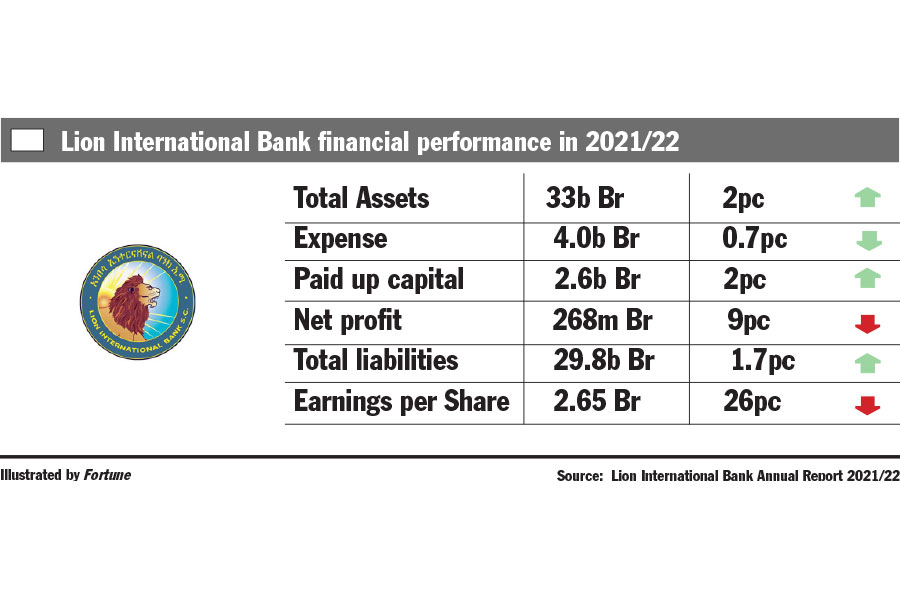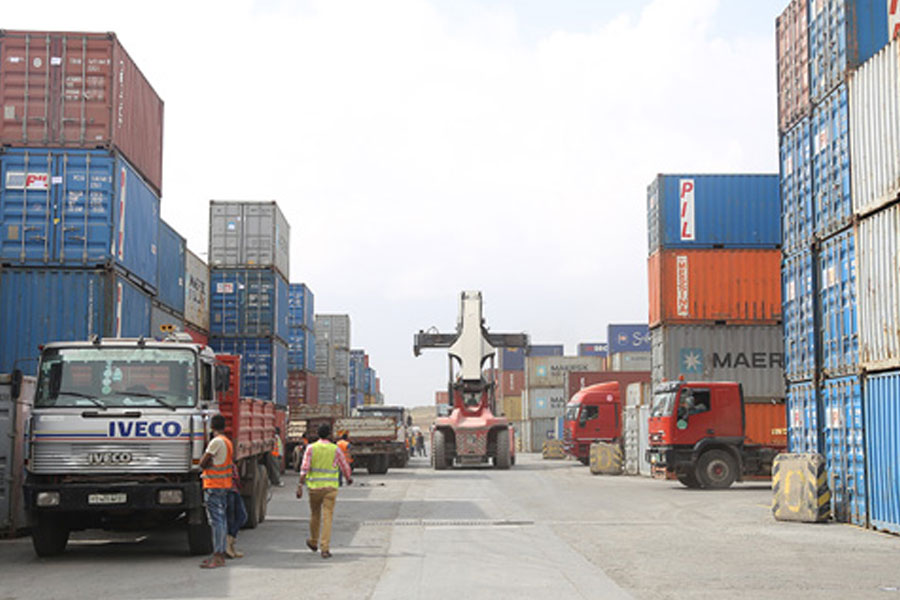
Taking electronics apart was Feleg Tsegaye's pastime as a kid even though he was not as good at putting them back together. His patient father looked on as he took apart many things in the house until he dismantled the family television for good.
"He got tired of it," said Feleg. "He told me that I'd have to leave things better than how I found them," a lesson that has stuck with Feleg to this day.
Twenty-odd years later, Feleg is now heading up Deliver Addis, an online food delivery and e-commerce business that has picked up tremendously over the past few years since it began operations in 2015. The inception of the business for this entrepreneur, who was born and raised in the United States, came not only from dabbling in electronics as a young child but his resistance to learning how to cook.
"I didn't want to learn how to cook, and I thought that starting a restaurant delivery business would be easier," he said. "I probably should have just learned to cook instead, but it's too late to change that now."
Feleg may be right since Deliver Addis, with over 100 restaurants and vendors listed on the site, has taken on a life of its own by providing food and grocery shopping services to the residents of the city and employment opportunities for many. With the onset of the Novel Coronavirus (COVID-19) pandemic in March, the company has become more valuable than ever by delivering meals and groceries straight to their homes.
With this came a period of adjustment, especially with regard to ensuring safety first, according to Feleg.
"We purchased a large stock of N95 masks to help ensure we had the necessary resources to keep customers and drivers safe," he said.
Once local production of masks started, the company donated the remaining N95 masks to the medical staff at St. Paulos Hospital. Because of the rising need for the company's online deliveries, a jump of 630pc since April, Deliver Addis has reduced prices by up to 30pc.
"We wanted to make it easier for people to stay home and self-isolate," he said. "In addition to the price reduction, we created a virtual supermarket on our website, partnering with vendors to help provide even more options for people looking to remain at home."
The business continues to serve not only its customers but businesses on its platform, which it has helped keep afloat at a time when people were too wary to visit them in person. Learning the importance of resilience and risk management is a takeaway, according to Feleg, who wants to see it turn to become "Deliver Ethiopia". The vision is to meet people where they are, anywhere in the country.
His vision is grand, not unlike the one Ethiopian entrepreneur that stands out to him, Bekele Molla, founder of the first chain of hotels in Ethiopia.
"He was a pioneer and had an incredibly ambitious vision for his time," said Feleg. "In the tech world, we're often focused on what's new, but history holds plenty of examples and lessons to draw from."
Deliver Addis continues to serve, and Feleg is looking to create better work and personal time balance in the meantime.
"Too much of any one thing is bad," he said. "Balance is certainly something worth striving for."
Dabbling in whatever attracts us as children, like Feleg and his electronic gadgets, may be one of the earliest indicators of what we truly love and enjoy doing. Halfway across the world, in the capital, a young Tsgega Woubishet also spent many hours making tables and traditional coffee placers, rekebots, as they are known locally.
He would later go on to design the local pizza chain across the city known as Effoi. The pizza chain has now grown to five locations, with the latest one opening up in Entoto Park, overlooking the city.
"I always liked working with my hands," said Tsega. "Woodwork has always been my thing, and you can see that reflected across the pizzerias."
Wooden seats and chairs, as well as potted plants, are indeed a recurring theme. His love for cooking, however, came much later - in his college days studying geology no less.
"I never thought it would be an alternate career, but I found passion in cooking," he said.
His pizzeria has been serving the city's residents for 11 years. A search for the creation of locally made food that was not injera was how Effoi came about, according to Tsega.
The eatery has been delivering its pizzas to customers for free since the onset of the pandemic. When he noticed that patients and medical professionals from COVID-19 quarantine centres were requesting orders, he dropped the prices by 30pc.
"Once the word got out, people started ordering and sending pizzas to the centres as a way to give back," he said.
Orders to Bole High School, the first improvised quarantine centre, along with Eka Kotebe, the first COVID-19 treatment centre in the country, became hotspots for pizza orders placed with Effoi.
When the pizza chain attempted the delivery mode nearly five years ago, it was a different landscape.
"We tried delivery some five years back in Mercato," he said.
Mercato, the ever-busy bustling market, had a lot of offices and no lunch counters.
"A combination that had seemed infallible," said Tsega. "But people were still not accustomed to ordering and having their food delivered, so we had to give it up momentarily."
But Tsega was reassured that pizza would do well in delivery and restarted the concept at the pizzeria's branch in Sarbet, named Effoi-Green. A couple of motorbikes, logistical kinks and the advent of online e-commerce delivery apps later, a successful pizza delivery system was in place.
Delivery and accessibility are parts of the big picture for Effoi. A predominantly young population and a fast-growing economy is a good combination for a business like Effoi, but this also means bracing themselves for international competition.
"We're working toward imprinting a strong foothold across the country," he said. "We stay competitive as the local brand."
A new interactive delivery application is also en route for the lovers of Effoi Pizza.
The latest addition to the chain in Entoto Park, rightfully named Effoi Zen, sits atop the mountain peak overlooking Addis. It is located near the Kuriftu Resorts branch, owned by Tadeos Belete, Tsega's favourite entrepreneur.
"The man has wild ideas that he goes for and gets them done at any cost," Tsega said.
This venue has also been his getaway.
"Building the place kept me active in this time," he said. "I was working outdoors in a place where you can see the whole city."
This has helped him stay well - this, and a determination to see a brighter future, according to him.
Determination is important as a reason to keep on moving for Tsega and sometimes as a reason to plough on despite all the odds.
When another programmer was cooking up different applications, her young age raised a lot of questions. People were wary of whether or not she would deliver the grandiose plans, according to her. The country's legal framework was another problem. But after a series of failed attempts, Samrawit Fikru, was uncompromising in her resolve. This time, she said, it was do or die. That is how Ride came about.
Born and raised in Assela, the ninth child of a big family, there was never a shortage of inspiring older siblings to look up to while she was growing up.
"My brothers were also doing business," she said, " and I grew up sharing ideas with them."
One brother in particular, an electrical engineer, she speaks of most fondly.
"He's a genius," she said. "He may not be that well-known, but his work has had an impact, and he has the ability to see more than a few years ahead."
She adds on Haile Gebreselassie, the gold Olympic athlete, who she lauds as a job creator and an investor who believes in the potential of his country.
Ride, the taxi-hailing application, came about as a solution to Samrawit's own problem in the city - transportation. Long lines and questions of safety while moving around the city late at night were the inspiration.
"Going home at night alone was very stressful," she said. "There was no guarantee for who would be taking you home."
So Ride was launched, an application where the drivers and cars were registered and accountable, and anyone could order a taxi. But the pandemic gave it an even stronger purpose.
The private nature of the rides coupled with its drivers armed with sanitiser and masks made people feel safe, according to Samrawit.
"We saw an increasing number of people choosing our service because of this," she said.
The busy operation has taken Samrawit's mind off the ongoing international crisis, helping her put one foot in front of the other.
"I have half a day off in a week," she said laughing. "I'm pushing to make it a full day."
Restrictions on meetings have hampered the progress of Ride in terms of making quick decisions, according to Samrawit. But the silver lining has been a moment of reflection that has been granted by the slowdown.
"It has given me time to pause and reassess how we do our business," she said. "These were things we didn't have time for when we were working."
Training put off for a later date was launched, call centres were expanded, and their technology saw an upgrade.
"Additionally, hygiene levels have picked up, hopefully for good," Samrawit said.
This programmer has bigger dreams for her company, to take Ride to other countries, to the world at large.
Most businesses have not been as lucky and perhaps one of the worst sectors in the country, and worldwide, has been tourism. So when Ethio Airs, a local tour and travel company, froze in its tracks, owner Betelhem Tadesse called a meeting to discuss the next steps forward. Their work had evaporated overnight, there was no source of income, and the livelihoods of employees were on the line.
"We had a meeting with my staff," she said, "and we threw ideas around."
The winning idea ended up being a disinfecting company, and three weeks later, Bethlehem had set aside former dreams to pursue one carved out of necessity. With the blessing of the Food & Drug Authority, the company had embarked on their disinfection and cleaning services.
"We were helping contain the spread of the virus," she said, "and keeping our business and employees' livelihood."
The company hired even more employees to run its business.
"What happened is terrible, but we have to ask ourselves what we can learn from it," she said.
While the business may not be as good as their last one, the company is covering its expenses and trailblazing the provision of disinfection services in the country at a time when it is desperately needed.
For this ingenious entrepreneur who was born in Kemise, Wollo, the pandemic has also brought her staff together.
"We celebrate the wins when we can," she said, "whether it's a bid for some work or someone's birthday."
Physical distance and masks in place, they are managing to go through these moments together. Although this line of business was unplanned, Bethlehem plans to move forward with it. The company is now importing gas fumigation machines and plans to start serving the coffee and pulse oilseed industry.
When the dust settles, Ethio Airs will also restart its tourism operations.
But her entrepreneurial spirit has played off well for her, a trait she developed as a young child tutoring other kids.
"I guess I was always used to having extra money," she laughs.
Perhaps the biggest player in the pandemic has been telecom service that has proven to be more invaluable than ever. People turned to their phones and gadgets to connect as they waited out the worst of the pandemic.
Ethio telecom's CEO, Frehiwot Tamiru, has been on the forefront on this, chairing meetings, brainstorming ideas and making decisions between the commercial and technical on a regular basis. Frehiwot has been present in the company since its rebranding from Ethiopian Telecommunications Corporation in 2014. The company, under her leadership, quickly rolled out its Stay At Home packages at the onset of COVID-19.
"We were telling people to stay at home," she said. "Thus, we came up with a package that would enable them to stay connected as they normally do."
The package avails text, call and data services at a lower price and has recently been amended to Stay Safe Mobile Packages with a 59pc discount.
The messaging was changed, because a lot of businesses have to go back to work, and the company prioritised safety first, according to Frehiwot.
"Businesses had to re-open, and life had to go on," she said. "We moved accordingly."
A jingle was added on to those making a call, reminding them to take extra care of themselves by washing their hands and wearing their masks.
A big risk to take as there was a good chance it could have overwhelmed the telecom system, according to Frehiwot. The telecom infrastructure did not cave, the informative jingles went through, and Ethio telecom was praised for the speedy action it took in awareness-raising.
"There is no growth without risks," said Frehiwot. "It needs to be calculated and informed, but it still has to be taken."
Though her journey at Ethio telecom had her climbing the corporate ladder much faster than most, she resigned and left for a few years in order to experience something different.
"I started at Ethio telecom straight out of university, and I wanted to test myself outside of that space," she said.
She opened DOXA IT Technology Plc, an information technology firm, and returned a few years later with a master's in business under her belt.
"Once I'm in, I'm in," she said. "It's about working toward your goal with a full heart."
As a young girl who spent most summers at her grandparent's house, she was under the tutelage of her grandmother, who she says is a perfectionist.
"It didn't matter whether it was the food being served or the house being cleaned. It was done faultlessly," she said.
Her current job is not an easy one. With over 40 million subscribers and 35,000 permanent and temporary employees to manage, hers is a demanding task that she says she loves to do passionately. Her resolve to utilise technology not only to solve problems but to generate income is what has brought her this far.
The company is taking steps to take care of its employees in this difficult time and currently has 2,000 of its employees working from home, those considered to be at higher risk for COVID-19.
Frehiwot's personal self-care routine revolves around taking time to listen to herself.
"I make time to have a quiet space for myself once a week," she said. "Oh, and I stretch."
PUBLISHED ON
Sep 11,2020 [ VOL
21 , NO
1063]

Viewpoints | Mar 11,2023

Fortune News | Nov 28,2020

Fortune News | Mar 25,2023

Fortune News | Apr 29,2023

Fortune News | Jun 21,2025

Commentaries | Jun 22,2024

Fortune News | Dec 04,2021


Agenda | Dec 01,2024

Sunday with Eden | Mar 09,2024

Dec 22 , 2024 . By TIZITA SHEWAFERAW
Charged with transforming colossal state-owned enterprises into modern and competitiv...

Aug 18 , 2024 . By AKSAH ITALO
Although predictable Yonas Zerihun's job in the ride-hailing service is not immune to...

Jul 28 , 2024 . By TIZITA SHEWAFERAW
Unhabitual, perhaps too many, Samuel Gebreyohannes, 38, used to occasionally enjoy a couple of beers at breakfast. However, he recently swit...

Jul 13 , 2024 . By AKSAH ITALO
Investors who rely on tractors, trucks, and field vehicles for commuting, transporting commodities, and f...

Oct 4 , 2025
Eyob Tekalegn (PhD) had been in the Governor's chair for only weeks when, on Septembe...

Sep 27 , 2025
Four years into an experiment with “shock therapy” in education, the national moo...

Sep 20 , 2025
Getachew Reda's return to the national stage was always going to stir attention. Once...

Sep 13 , 2025
At its launch in Nairobi two years ago, the Africa Climate Summit was billed as the f...